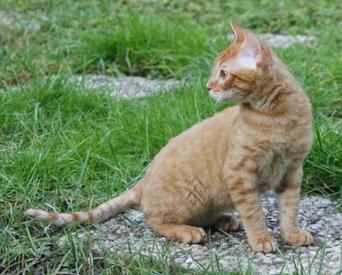
The particulars of this cat’s history are uncertain, although there is enough concrete evidence to say that the German Rex developed from Kater Munk, the curly-coated son of a Russian Blue and an Angora. Munk was unique in coat type and went on to breed with many local cats in Konigsberg, Germany, although most of his offspring were delivered with a smooth, straight coat. Later in 1947, a curly-coated cat was seen in the grounds of a hospital in Berlin, and attracted much intrigue and speculation. It was widely thought that this female cat was the result of a genetic mutation, and eventually, having produced no curly-coated kittens with her usual partner Blackie, the cat was bred to one of her sons. The result was a litter of four, boasting two normal coated and two curly-coated kittens. This proved that the gene was recessive, and only two curly-coated cats could produce similar offspring. For this reason, the gene pool is small and every effort is being made to preserve the breed.
Slender in appearance, yet strong and agile, the German Rex possesses a desirable look. The breed standard stipulates that a German Rex should be medium in size, with well-developed legs, bright eyes of a colour corresponding to the coat, medium to large ears, a rounded chest and well-rounded paws. The striped patterning seen in many cats is observed in the German Rex, and all coat colours are permissible. Some of the most commonly seen colours include black, brown, chocolate, tabby, white, cream, and cinnamon. The coat only sheds moderately, so minimal grooming is required.
These intelligent creatures are well adapted to domestic living and can be trained to a good degree. They enjoy nothing better than spending time with their human family and being included in activities around the house. Inherently gentle, affectionate and loyal, the German Rex is the perfect companion for families or a dedicated sole owner. They also possess a mischievous streak which makes them a joy to live with! The Rex is compatible with children and other house pets and should not show undue shyness or aggression. On average, a healthy German Rex will weigh 12 pounds, with a typical life expectancy of 10-15 years.
Shown to be very healthy and resilient, any genetic or breed-specific conditions are difficult to determine due to the rarity of the breed.
Do you own a German Rex? Let others know what they're like!
Related products
Advantage 80 Spot On Flea Control Large Cats and Rabbits
from £12.95
Advantage 40 Spot On Flea Control Cats, Small Dogs and Rabbits
from £12.95
Advantage 100 Spot On Flea Control Medium Dog
from £12.95
Advantage 250 Spot On Flea Control Large Dog
from £12.95
Drontal Tasty Bone Wormer Tablets for Small & Medium Dogs (2 to 20kg)
from £2.15
TermaWorm™ Tablets for Cats & Dogs
from £1.59
FRONTLINE Plus Flea & Tick Treatment Dogs & Cats
from £17.49
Drontal Tasty Bone XL Wormer Tablets for Large Dogs (Over 20kg)
from £6.39